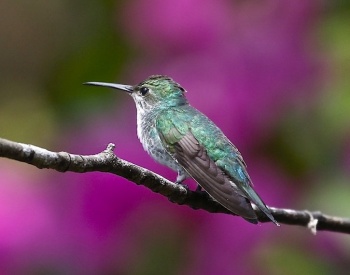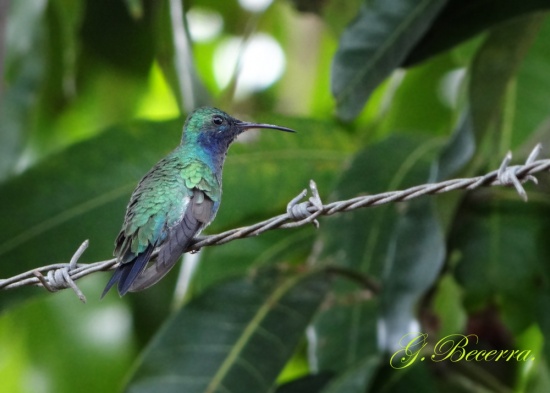Sbarnhardt (talk | contribs) (Add copyright to Panama Harpy & Stanley Jones images) |
Sbarnhardt (talk | contribs) (Update scientific name to new one & italicised old one below it, Updated Category) |
||
| Line 1: | Line 1: | ||
[[Image:Sapphire-throated Hummingbird Lepidopyga coeruleogularis La Villa.jpg|thumb|550px|right|Photo © by {{user|PanamaHarpy|PanamaHarpy}} <br />La Villa de Los Santos, [[Panama]], September 2011]] | [[Image:Sapphire-throated Hummingbird Lepidopyga coeruleogularis La Villa.jpg|thumb|550px|right|Photo © by {{user|PanamaHarpy|PanamaHarpy}} <br />La Villa de Los Santos, [[Panama]], September 2011]] | ||
| − | ;[[:Category: | + | ;[[:Category:Chrysuronia|Chrysuronia]] coeruleogularis |
| + | ''Lepidopyga coeruleogularis'' | ||
==Identification== | ==Identification== | ||
| Line 32: | Line 33: | ||
{{GSearch|Lepidopyga+coeruleogularis}} | {{GSearch|Lepidopyga+coeruleogularis}} | ||
| − | [[Category:Birds]] [[Category: | + | [[Category:Birds]] [[Category:Chrysuronia]] |
Revision as of 12:12, 18 December 2021
- Chrysuronia coeruleogularis
Lepidopyga coeruleogularis
Identification

Avicar Restaurant, Torti, Chepo District, Panamá Province, Panama, February 2018
8·5–9·5 cm (3¼-3¾in)
Bill black except for lower mandible where basal half is reddish.
Mostly metallic green to bright green with throat and upper breast violet-blue while tail is forked and dark blue.
Female differs in having underparts mostly white with green flanks and tail that is white-tipped and have green central tail feathers.
Distribution
South-west Costa Rica (between the Osa Peninsula and the Panama border), Panama, and Colombia.
Taxonomy
Subspecies
Three subspecies are recognized[1]:
- L.c. coeruleogularis - Pacific slope of south-western Costa Rica and western Panama (Chiriquí to Canal Zone)
- L.c. confinis - Caribbean slope and some of Pacific slope of eastern Panama (Darién) and adjacent north-western Colombia
- L.c. coelina - North Colombia (northern Chocó to Santa Marta region)
Habitat
Moist, open lowland forests, clearings, scrub, or mangrove, mostly within a few miles of the coast.
Behaviour
Diet
Their main diet consists of nectar and arthropods. They are mostly seen feeding rather low on flowers, often in scrubs, otherwise trees.
Breeding
They place their small cup-shaped nest in the fork of a tree.
References
- Clements, J. F., T. S. Schulenberg, M. J. Iliff, D. Roberson, T. A. Fredericks, B. L. Sullivan, and C. L. Wood. 2017. The eBird/Clements checklist of birds of the world: v2017, with updates to August 2017. Downloaded from http://www.birds.cornell.edu/clementschecklist/download/
- Ridgely & Gwynne 1989. Birds of Panama. Princeton Paperbacks. ISBN 0691025126
- Angher and Dean, The Birds of Panama
- Handbook of the Birds of the World Alive (retrieved March and April 2018)
Recommended Citation
- BirdForum Opus contributors. (2024) Sapphire-throated Hummingbird. In: BirdForum, the forum for wild birds and birding. Retrieved 7 May 2024 from https://www.birdforum.net/opus/Sapphire-throated_Hummingbird




